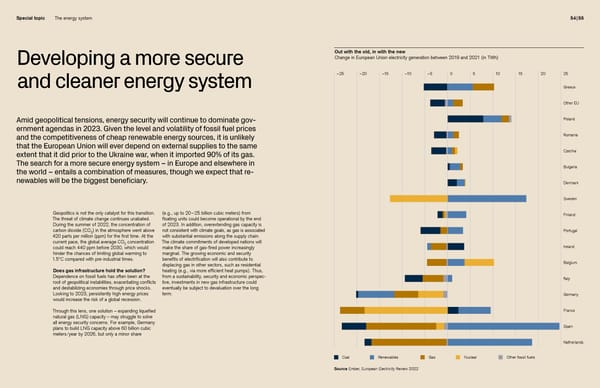Special topic The energy system 54 | 55 Out with the old, in with the new Developing a more secure Change in European Union electricity generation between 2019 and 2021 (in TWh) and cleaner energy system – 25 – 20 –15 –10 – 5 0 5 10 15 20 25 Greece Other EU Amid geopolitical tensions, energy security will continue to dominate gov- Poland ernment agendas in 2023. Given the level and volatility of fossil fuel prices and the competitiveness of cheap renewable energy sources, it is unlikely Romania that the European Union will ever depend on external supplies to the same extent that it did prior to the Ukraine war, when it imported 90% of its gas. Czechia The search for a more secure energy system – in Europe and elsewhere in Bulgaria the world – entails a combination of measures, though we expect that re- newables will be the biggest beneficiary. Denmark Sweden Geopolitics is not the only catalyst for this transition. (e.g., up to 20 – 25 billion cubic meters) from Finland The threat of climate change continues unabated. floating units could become operational by the end During the summer of 2022, the concentration of of 2023. In addition, overextending gas capacity is carbon dioxide (CO2) in the atmosphere went above not consistent with climate goals, as gas is associated Portugal 420 parts per million (ppm) for the first time. At the with substantial emissions along the supply chain. current pace, the global average CO concentration The climate commitments of developed nations will 2 Ireland could reach 440 ppm before 2030, which would make the share of gas-fired power increasingly hinder the chances of limiting global warming to marginal. The growing economic and security 1.5°C compared with pre-industrial times. benefits of electrification will also contribute to Belgium displacing gas in other sectors, such as residential Does gas infrastructure hold the solution? heating (e.g., via more efficient heat pumps). Thus, Dependence on fossil fuels has often been at the from a sustainability, security and economic perspec- Italy root of geopolitical instabilities, exacerbating conflicts tive, investments in new gas infrastructure could and destabilizing economies through price shocks. eventually be subject to devaluation over the long Looking to 2023, persistently high energy prices term. Germany would increase the risk of a global recession. Through this lens, one solution – expanding liquefied France natural gas (LNG) capacity – may struggle to solve all energy security concerns. For example, Germany plans to build LNG capacity above 60 billion cubic Spain meters/year by 2026, but only a minor share Netherlands Coal Renewables Gas Nuclear Other fossil fuels Source Ember, European Electricity Review 2022
 Credit Suisse Investment Outlook 2023 Page 27 Page 29
Credit Suisse Investment Outlook 2023 Page 27 Page 29